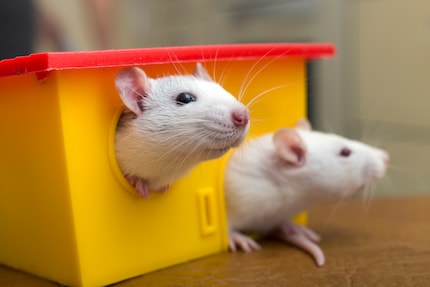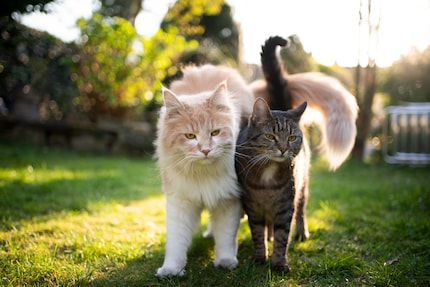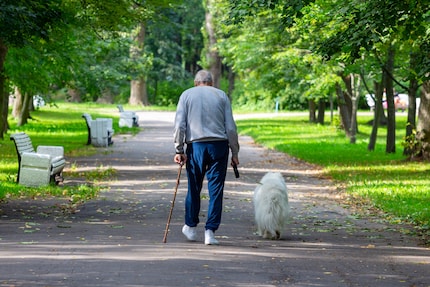
Background information
The perfect pet? Here’s what it’s like to have pet rats
by Michael Restin

From the cradle to the grave: sharing your life with a four-legged animal strengthens both body and soul. Older people aren't the only ones who devote themselves to their pets; younger people also have a sense of responsibility.
It's not an uncommon sight on our streets: a woman of a certain age accompanied by a dog, usually already elderly too. In fact, that's how it works in my family too. My mother is now 80 and has been walking dogs for over 40 years. Why do I know this so well? Because when I was 10, I wanted a dog. My greatest wish was to have a West Highland White Terrier. I wanted a dog of this breed at all costs. I loved being stroked and cuddled. As for the rest, i.e. walking the dog and feeding him, as you'd expect, my motivation evaporated fairly quickly. My mother, on the other hand, took on these tasks with great enthusiasm.
After Westi 1, there was Westi 2 and a slightly crazy bitch came to complete the gang. Since my father died, my mother has lived alone. And mankind's best friend helps keep her fit and alert. When it's sometimes said that "the youngest is a furball", we're not really far off the mark.
After telling you about my life, we can already draw one small conclusion: you can't be the master or mistress that an animal deserves at any age. But in most cases, when life becomes quieter, a pet helps to maintain your body and mind. Scientifically, these therapeutic benefits have long been proven.
For the elderly, there's another benefit: "Seniors take better care of themselves when someone is depending on them. They maintain a certain routine. They take their medication regularly because someone is counting on them," explains Susan Kurowski, the founder of Pets for the Elderly, an American association that helps senior citizens adopt (often equally elderly) pets.
There is no official age limit, however: Swiss magazine Tierwelt asked more than 30animal shelters in German-speaking Switzerland to what extent the maturity of the people concerned plays a role in the placement. Of the 16 shelters that replied, none indicated that people of a certain age could no longer adopt animals. Age is certainly a factor in determining whether or not an adoption can take place, but getting older is very individual, just as the animals to be placed are very individual, both in age and nature.
An exciting demographic shift is underway: for many millennials, dogs and cats matter more than their own family members, or even their potential offspring. A survey by Consumeraffairs of a target group aged between 26 and 40 revealed that 57 per cent of respondents love their animal companion more than their siblings. 30 per cent said they preferred their pet to their partner.
And therein lies the rub: more than half of millennials said in the survey that they would rather adopt a pet than become parents. This idea was particularly pronounced among cat owners: 63 per cent prefer an indoor feline to a human offspring.
And there are plenty of millennials: In Switzerland in 2021, the previous generation X was still in the majority on the labour market (35.9per cent), but it is only 0.7 per cent ahead of this dominant age group, which prefers the leash and the cat tree to the pushchair.
According to previous studies, dogs in particular are often adopted to replace a partner and reinforce psychological stability. Today, pets are no longer just gentle supporters, they have become an element of identity. The phrase "the youngest is a hairball" is losing its meaning. It could one day be replaced by "The first and last child is a hairball". In the meantime, I'd like to present you with a little insight that allows you to see which animal is best suited to which stage of life.
Pets train our social skills from childhood. But they are not toys, they are sentient living beings with different needs apart from cuddling. Only if the whole family can meet them should this great responsibility be taken on.
From around the age of eight or nine, children can look after their own small pet. In the general opinion of experts, they are not mature enough to have a cat or dog until they are 14 or 15. However, it's important to bear in mind that each animal has its own personality: some cats react quite badly to the sudden arrival of a baby in the family, while others are very enthusiastic.

The same applies to dogs: although they are extremely endearing, their temperament may not be suitable for children. In addition to their still impetuous movements, little ones don't yet have the ability to put themselves in the shoes of other living beings and don't understand, for example, when an elderly or sick dog simply wants to be left alone. To understand this better, I recommend you take the test on the hausinfo.ch information site, which aims to promote respect for animals in Switzerland. And this applies to all ages.
Children and teenagers will find all the information they need about keeping dogs, cats, guinea pigs, hamsters, parakeets, gerbils, rats, fish and rabbits, as well as a quiz to help them decide which animal is best for them. Also online: a pet contract to help work out who looks after pets at home.
American insurer Many Pets has zealously gathered studies and statistics to examine how different generations treat their pets. The result? As we've already mentioned, it's those in midlife who look after their pets best. 24 per cent of Generation Xers (born between 1965 and 1980) and 27 per cent of Baby Boomers (born up to 1964) regard cats and dogs as members of the family. It is not possible to give a clear recommendation to such a large and varied group. Lifestyles and points of view are too different.

But according to the American study, in the summer of life, the focus should be on forming a pack: the majority believe that most animals also need companionship and therefore often own several pets.
When social contact is scarce, cats greatly improve well-being at home. However, cat owners don't have the opportunity to see people when out walking. This means that people with dogs are more solicited and socially involved by mankind's best friend. Calm, small to medium-sized, undemanding dogs are particularly well suited to the elderly, but they too have a need for exercise that must be met.

Cats, on the other hand, are easy to keep in flats and are especially suitable for older people who find it hard to walk and rarely get around. But woof or meow: young animals can on the one hand be tiring and on the other are unlikely to outlive their owners. So, dear seniors: adopt a senior. Animals with already-defined characters, who have already outgrown their stormy, restless phase, are a real asset to the over-60s.
And apart from that? Adopt, don't buy. It's precisely in animal shelters and care centres that many four-legged creatures are waiting for a loving home. And that goes for every generation.
Headline photo: Shutterstock
Health, sexuality, sports and sustainability. Delve into all aspects of this life less ordinary with the right amount of curiosity, humour and a pinch of salt.
Interesting facts about products, behind-the-scenes looks at manufacturers and deep-dives on interesting people.
Show all
Background information
by Michael Restin

Background information
by Mareike Steger

Background information
by Michael Restin